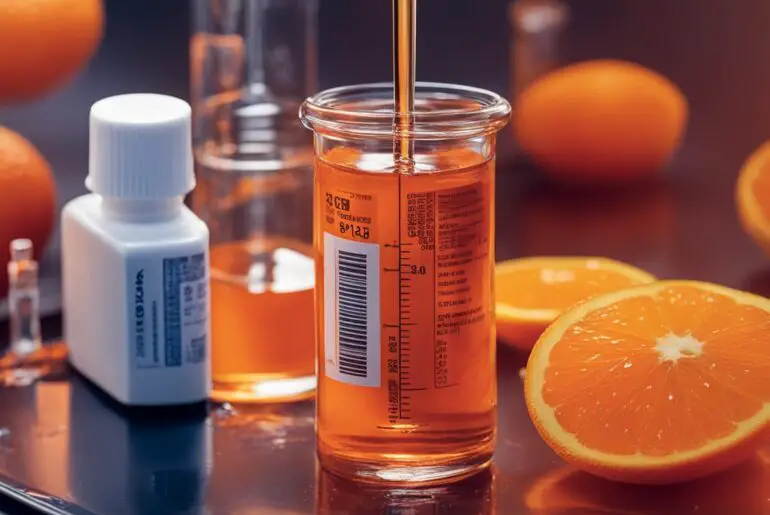Are nutritional supplements necessary for achieving success on the HCG diet? Many people turn to this controversial weight loss approach in hopes of shedding pounds quickly, but the use of HCG supplements has raised concerns among experts and regulatory agencies. Is there a way to enhance the effectiveness of the HCG diet with the right nutritional support? Let’s explore the role of nutritional supplements in HCG diet success and separate fact from fiction.
Key Takeaways:
- Nutritional supplements are not recommended on the HCG diet, as the protocol is designed to derive necessary nutrients from stored fat and minimal food intake.
- Consulting with a healthcare provider is crucial for personalized guidance and support throughout the weight loss journey.
- The HCG diet is a controversial weight loss approach that involves severe calorie restriction and the use of HCG supplements.
- While the HCG diet may lead to short-term weight loss, it also poses risks such as nutrient deficiencies and potential side effects.
- After completing the HCG diet, it is important to focus on replenishing any nutrient deficiencies and maintaining a balanced and healthy eating plan to sustain weight loss.
The Safety of HCG Diet Products
The use of HCG diet supplements and HCG diet support supplements has raised concerns about their safety and effectiveness. The FDA has issued warnings against the use of over-the-counter weight-loss products that contain HCG. HCG, a hormone produced during pregnancy, is primarily used as a prescription medication for fertility issues and is not approved for over-the-counter use.
Over-the-counter HCG weight-loss products labeled as “homeopathic” are still considered unsafe by the FDA. It’s important to note that these products are breaking the law, as they are not authorized for weight loss purposes.
The severe calorie restriction that characterizes the HCG diet may result in short-term weight loss. However, this diet also poses risks such as an increased risk of cancer and other health complications. It is advisable to explore safer alternatives for weight loss under the guidance of a healthcare professional.
Remember, your health and well-being should always be a top priority when considering any weight loss program or supplement.
Vitamin and Mineral Intake on the HCG Diet

The HCG diet is a very low-calorie diet that restricts food intake, potentially leading to a limited intake of essential vitamins and minerals. During the 500-calorie phase of the HCG diet, it is generally advised to postpone vitamin supplementation, as many vitamin products contain calories, sugars, starches, and oils that can impede weight loss.
Specific Vitamin Allowances
However, Dr. Simeons, the doctor who developed the HCG diet protocol, allowed for the intake of certain vitamins under specific conditions. Calcium and vitamin D were permitted for individuals with tooth issues, while vitamin C was recommended during the onset of a head cold in combination with an antihistamine.
It is important to note that the HCG diet is designed to derive necessary nutrients from stored fat and minimal food intake.
| Vitamin | Permitted Circumstances |
|---|---|
| Calcium | For individuals with tooth issues |
| Vitamin D | For individuals with tooth issues |
| Vitamin C | During onset of head cold with antihistamine |
It is important to consult with a healthcare provider before considering any vitamin supplementation while on the HCG diet to ensure it aligns with your specific circumstances and weight loss goals.
Can You Take Vitamins on the HCG Diet?
When it comes to vitamin supplementation on the HCG diet, opinions vary. Dr. Simeons, the pioneer of the HCG diet protocol, believed that additional vitamins were unnecessary. He maintained that the body receives all the necessary nutrients from the stored fat being burned for energy and the limited food intake on the diet. According to Dr. Simeons, patients on the HCG diet would not experience significant deficiencies in vitamins or minerals.
However, there were exceptions to this rule. Dr. Simeons allowed for the use of certain vitamins under specific circumstances. For example, vitamin D and vitamin C were permitted for individuals with specific needs. Vitamin B12 injections, drops, or capsules were also recommended by some practitioners to help alleviate fatigue and increase energy levels.
It is important to note that individual experiences may vary, and consulting with a healthcare provider before considering any vitamin supplementation while on the HCG diet is essential. A healthcare provider can provide personalized guidance based on an individual’s specific needs and health history.
“While Dr. Simeons assured his patients that additional vitamins were unnecessary, it is always best to consult with a healthcare professional for personalized advice.”
Ultimately, the decision to take additional vitamins while on the HCG diet should be made in consultation with a healthcare provider. They can evaluate an individual’s specific needs and advise on the best course of action. It is also important to remember that the HCG diet is a temporary weight loss approach, and once the diet is completed, individuals can resume normal vitamin supplementation as part of a healthy and balanced diet.
Considerations for Vitamin Supplementation on the HCG Diet:
- Consult with a healthcare provider before considering any vitamin supplementation on the HCG diet.
- While Dr. Simeons believed additional vitamins were unnecessary, he allowed for the use of certain vitamins under specific circumstances, such as vitamin D and vitamin C.
- Vitamin B12 injections, drops, or capsules may be prescribed to help increase energy levels.
Note: The use of additional vitamins while on the HCG diet may vary from person to person. Always consult with a healthcare provider for personalized advice.
| Vitamin | Benefits | Recommended Form |
|---|---|---|
| Vitamin D | Supports bone health and immune function | Non-oily, non-capsule form |
| Vitamin C | Aids in collagen production and immune function | Non-oily, non-capsule form |
| Vitamin B12 | Helps increase energy levels | Injections, drops, or capsules (check for added sugars or artificial flavors) |
Important Considerations for Vitamin Intake on the HCG Diet

While the HCG diet typically discourages vitamin supplementation, there are certain circumstances where it may be necessary to include specific vitamins in your routine. Here are some important considerations and guidelines to follow:
Vitamin D and Vitamin C
If needed, you can take vitamin D and vitamin C supplements on the HCG diet. However, it is important to choose non-oily, non-capsule forms of these vitamins. This ensures that you are not consuming any additional ingredients or nutritional values such as calories, carbs, or sugars that could interfere with your weight loss goals.
Vitamin B12 Supplementation
Vitamin B12 supplementation is another option that you may consider while on the HCG diet. However, it is essential to check the labels for added sugars or artificial flavors. Choose high-quality HCG diet supplements that are free from any unnecessary ingredients that could hinder your progress.
Homeopathic Cell Salts
If you experience muscle cramps during the HCG diet, homeopathic cell salts can be helpful. However, it is crucial to source these salts from a reputable homeopathic provider. Ensure that the product meets the highest quality standards to support your overall well-being.
When taking vitamins on the HCG diet, it is essential to be mindful of your overall intake. Minimize the usage of unnecessary supplements and only take what is necessary to support your body’s needs and ensure the best results while adhering to the HCG protocol.
| Supplement | Considerations |
|---|---|
| Vitamin D and Vitamin C | Choose non-oily, non-capsule forms. Avoid additional ingredients or nutritional values. |
| Vitamin B12 | Check for added sugars or artificial flavors in the supplement. Opt for high-quality options. |
| Homeopathic Cell Salts | Source from a reputable provider to address muscle cramps. |
Vitamin Supplementation After the HCG Diet
https://www.youtube.com/watch?v=c5tqnRWfeFc
After completing the HCG diet, it is essential to replenish any nutrient deficiencies that may have occurred during the diet. One effective way to support overall health and provide essential nutrients is by taking top-rated HCG diet supplements. These supplements are specially formulated to meet the unique needs of individuals who have undergone the HCG diet. They contain a blend of vitamins, minerals, and other key nutrients, specifically targeted to support weight loss and maintain a healthy body balance. Taking these supplements on a daily basis can help ensure that your body gets the necessary nutrients it needs to function optimally.
In addition to top-rated HCG diet supplements, it is crucial to continue eating a balanced and nutritious diet to sustain the weight loss achieved during the HCG diet. Incorporating HCG diet minerals, such as calcium, magnesium, and potassium, into your meals can help support healthy body function and prevent any potential deficiencies. These minerals play a vital role in various bodily processes, including muscle function, nerve transmission, and maintaining electrolyte balance. Including foods rich in these minerals, such as leafy green vegetables, nuts, and seeds, can further enhance your overall health and well-being.
Staying hydrated is another essential aspect of maintaining weight loss after the HCG diet. Drinking an adequate amount of water throughout the day helps regulate metabolism, aids digestion, and promotes overall wellness. Aim to drink at least eight glasses of water daily and listen to your body’s thirst signals to ensure proper hydration.
Choosing the right foods is also key to sustaining weight loss. Focus on consuming whole, nutrient-dense foods such as lean proteins, fruits, vegetables, and whole grains. These foods provide essential vitamins, minerals, and antioxidants that support overall health and aid in weight management.
Lastly, maintaining good overall lifestyle habits is crucial for long-term weight loss success. Regular physical activity, adequate sleep, stress management, and self-care practices all play a role in maintaining a healthy weight and overall well-being. Incorporate activities you enjoy, such as walking, dancing, or yoga, into your daily routine to promote an active and balanced lifestyle.
By following these guidelines and incorporating top-rated HCG diet supplements, you can maximize the benefits of the HCG diet and support your body’s long-term health. Consult with a healthcare professional for personalized guidance and recommendations on effective weight loss supplements for the HCG diet.
Conclusion
The HCG diet remains a controversial weight loss approach, primarily due to its severe calorie restriction and the use of HCG supplements. While the HCG diet may lead to short-term weight loss, it also poses risks and is not considered a safe or effective long-term weight loss solution.
The importance of nutrient intake, including vitamins and minerals, cannot be overlooked on any diet, including the HCG diet. While Dr. Simeons allowed for limited vitamin supplementation, it is generally advised to focus on obtaining nutrients from the diet and stored fat during the HCG diet.
After completing the HCG diet, vitamin supplementation can be resumed, along with a balanced and healthy eating plan, to maintain weight loss. Consulting with a healthcare professional is crucial for personalized guidance and support throughout the weight loss journey.
FAQ
Are there nutritional supplements that can support HCG diet success?
While the HCG diet primarily focuses on severe calorie restriction, some individuals may choose to supplement their diet with vitamins and minerals. However, it is important to consult with a healthcare professional before starting any supplements to ensure they are safe and appropriate for your individual needs.
Are HCG diet supplements safe to use?
The use of HCG supplements for weight loss has been deemed ineffective and potentially unsafe by the FDA. It is important to note that over-the-counter HCG weight-loss products are not approved by the FDA and may pose risks to your health. It is advisable to explore safer and more sustainable weight loss strategies under the guidance of a healthcare professional.
Can I take vitamins and minerals on the HCG diet?
The HCG diet is a very low-calorie diet that restricts food intake, potentially leading to a limited intake of essential vitamins and minerals. While the HCG diet protocol generally discourages vitamin supplementation, there are some exceptions. It is important to consult with a healthcare provider to determine if vitamin supplementation is necessary for your specific circumstances.
What are the best supplements for the HCG diet?
While the HCG diet typically discourages the use of additional supplements, if necessary, certain vitamins like vitamin D and vitamin C can be taken under specific conditions. However, it is important to choose high-quality supplements that are free from any additional ingredients, calories, sugars, or oils that may interfere with weight loss. Consulting with a healthcare professional can help you identify the best options for your needs.
What should I consider when taking vitamins on the HCG diet?
When considering vitamin supplementation on the HCG diet, it is important to choose supplements that do not contain any additional ingredients or nutritional values such as calories, carbs, or sugars. It is also crucial to minimize vitamin intake and only take what is necessary to ensure the best results and adherence to the HCG diet protocol. Consulting with a healthcare professional can provide personalized guidance for your specific needs.
Can I take vitamins after completing the HCG diet?
After completing the HCG diet, there are no restrictions on vitamin supplementation. In fact, it is important to focus on replenishing any nutrient deficiencies that may have occurred during the diet. Taking a daily multivitamin can help support overall health and provide essential nutrients. However, it is still crucial to maintain a balanced and nutritious diet to sustain the weight loss achieved during the HCG diet.
Conclusion
While there may be some debate about the use of nutritional supplements on the HCG diet, it is important to prioritize safety and consult with a healthcare professional for guidance. The HCG diet remains a controversial weight loss approach, and it may be more beneficial to explore safer alternatives for weight loss that focus on long-term success and overall health.




